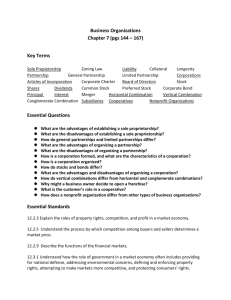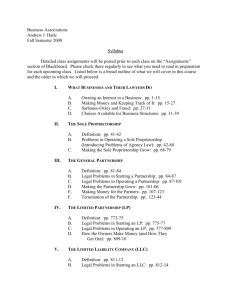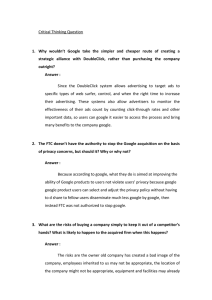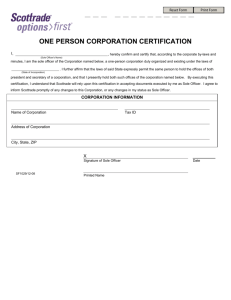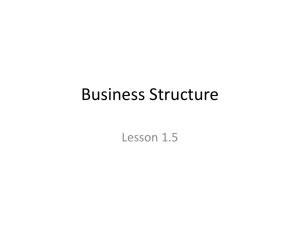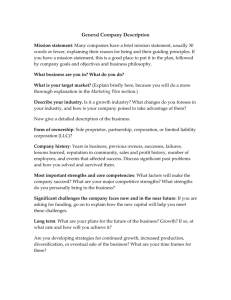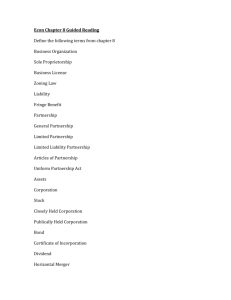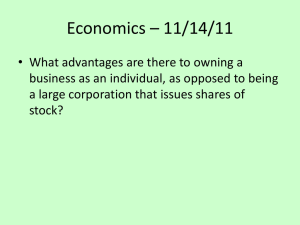Name : Tri Arthi Bagja K. NIM : 41808808 Class : IK
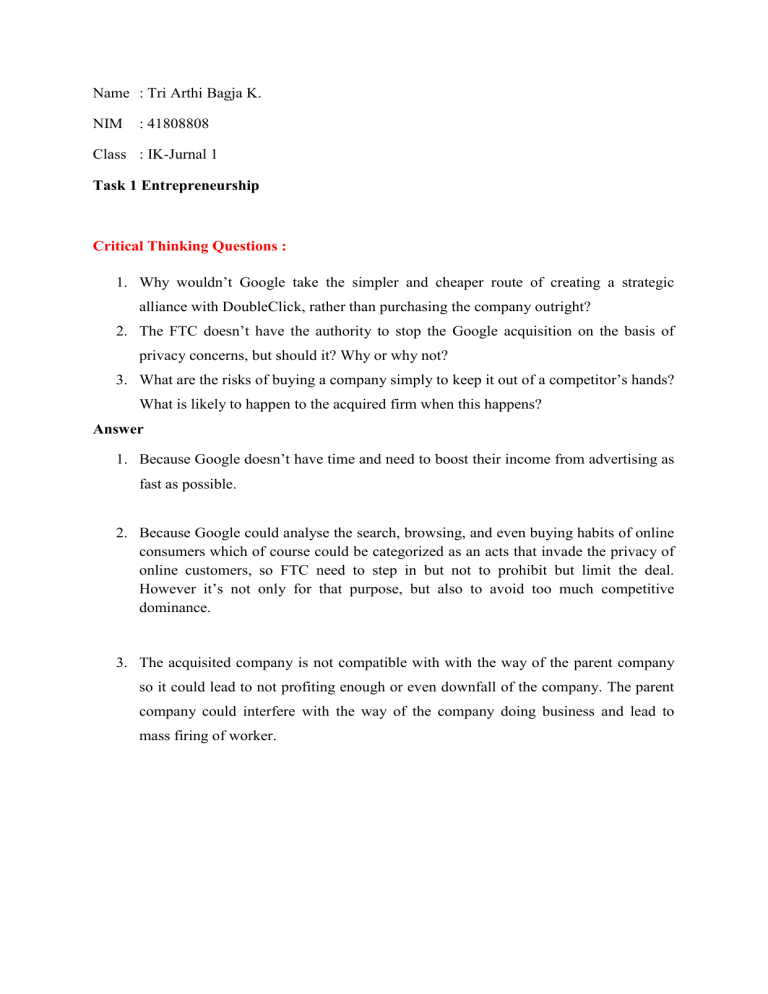
Name : Tri Arthi Bagja K.
NIM : 41808808
Class : IK-Jurnal 1
Task 1 Entrepreneurship
Critical Thinking Questions :
1.
Why wouldn’t Google take the simpler and cheaper route of creating a strategic alliance with DoubleClick, rather than purchasing the company outright?
2.
The FTC doesn’t have the authority to stop the Google acquisition on the basis of privacy concerns, but should it? Why or why not?
3.
What are the risks of buying a company simply to keep it out of a competitor’s hands?
What is likely to happen to the acquired firm when this happens?
Answer
1.
Because Google doesn’t have time and need to boost their income from advertising as fast as possible.
2.
Because Google could analyse the search, browsing, and even buying habits of online consumers which of course could be categorized as an acts that invade the privacy of online customers, so FTC need to step in but not to prohibit but limit the deal.
However it’s not only for that purpose, but also to avoid too much competitive dominance.
3.
The acquisited company is not compatible with with the way of the parent company so it could lead to not profiting enough or even downfall of the company. The parent company could interfere with the way of the company doing business and lead to mass firing of worker.
ONLINE
1.
Visit Google’s website at www.google.com and click on “Advertising Programs”. If you were a sole proprietor, how could you use these services to promote your business? If you were the advertising manager of a major corporation, how might you use Google’s advertising services?
Answer
1.
As sole proprietor, we could use the advertising service by using the approriate words or phrase that represent our product or service, so that when potential customer put the words or phrase in the keyword of search engine, our advertisement will appear next to search result.
As advertising manager of major corporation, we just need to learn about what popular in search topic at the moment so that we can fit the phrase for our keyword that also represent our best or the company’s slogan
Questions for Review
1.
What are the three basic forms of business ownership?
2.
What is the difference between a general and a limited partnership?
3.
What is a closely held corporation, and why do some companies choose this form of ownership?
4.
What is the role of a company’s board of directors?
5.
What is culture clash?
Answer
1.
Sole proprietor, corporation, partnership
2.
Limited partnership is a form of partnership similar to a general partnership, except limited partners do not receive dividends, but enjoy direct access to the flow of income and expenses.
3.
Closely held corporation is a corporation in which more than half of the shares are held by fewer than 5 individuals. Closely held corporations are private companies, and are not publicly held. In a closely held corporation, if one of the shareholders wants to sell some or all of his/her shares, the sale must take place with one of the other existing shareholders, since no sale of shares can take place.
4.
Typical duties of boards of directors include: governing the organization by establishing broad policies and objectives, selecting, appointing, supporting and reviewing the performance of the chief executive, ensuring the availability of adequate financial resources, approving annual budgets, accounting to the stakeholders for the organization's performance, and setting the salaries and compensation of company management.
5.
It is when a (business) culture in one country can’t be applied or doesn’t fit in another country
Questions for Analysis
6.
Why is it advisable for partners to enter into a formal partnership agreement?
7.
To what extend do shareholders control the activities of a corporation?
8.
How might a company benefit from having a diverse board of directors that includes representatives of several industries, countries, and cultures?
9.
Why do so many mergers fail?
10. Ethical Considerations.
Your father sits on the board of directors of a large, welladmired public company. Yesterday, while looking for an envelope in his home office, you stumbled on a confidential memorandum. Unable to resist the temptation to read the memo, you discovered that your father’s company about the possibility of a merger, with
Dad’s company being the survivor. Dollar signs flashed in your mind. Should the merger occur, the value of the other company’s stock is likely to soar. You’re tempted to log onto your E*TRADE account in the morning and place an order for 1,000 shares of that company’s stock. Better still, maybe you’ll give a hot tip to your best friend in exchange for the four Cherrybelle tickets your friend has been flashing in your face all week.
Would either of those actions be unethical? Explain your answer.
Answer
6.
To reach mutual benefit.
7.
The shareholders can only advice the corporation, but can’t involved in corporation business directly.
8.
To improve company sales and marketing and help ekspanding business in the near future.
9.
The differents vision and mission and unffair profit sharing.
10.
It is unethical. First, the information itself is highly confidential so it’s not ethical to casually open and read the information. Second, by doing so you could ruin your father’s reputation as other people will think that you doing so because your father tell you the information beforehand in secrecy.
Questions for Application
11.
Suppose you and some friends want to start a business to take tourist on wilderness backpacking expeditions. None of you has much extra money, so your plan is to start small. However, if you are successful, you would like to expand into other types of outdoor tours and perhaps even open up branches in other locations. What form of ownership should your new enterprise take, and why?
12.
How This Affect You. Do you own or have you ever considered owning stock? If so, what steps have you taken to ensure that company management has shareholder interest in mind?
13.
Integrated. You’ve developed considerable expertise in setting up new manufacturing plants, and now you’d like to strike out on your own as a consultant who advises other companies. However, you recognized that manufacturing activity tends to expand and contract at various times during the business cycle. Do you think a single-consultant sole proprietorship or a small corporation with a half dozen or more consultants would be better able to ride out tough times at the bottom of a business cycle?
Answer
11. I choose partnership, because even the profit is split betwen us, the responsibilites also be splited. So each one of us can handle one or two part of business to increase the eficiency.
12. yes, i do have interest in owning stock. Making sure that shareholder’s interest also benefits the company.
13. I think a single consultant sole proprietorship will be better in the difficult time, because small company need to think about the expense of the consultants which cost a lot of money while the profit is in the lowest point.
Sharpening Your Communication Skill
You have just been informed that your employer is going to merge with a firm in Thailand.
Because you know very little about Thailand culture and business practices, you think it might be a good idea to do some preliminary research-just in case you have to make a quick trip overseas. Using the Internet or library sources, find information on Thailand culture and customs and prepare a short report discussing such cultural differences as social values, decision-making customs, concepts of time, use of body language, social behavior and manners, and legal and ethical behavior.
Answer
Thailand have a different manner with Indonesia. One of the unique manner is the one called
“
Hai-Kiat”. Hai-Kiat is the Thai word for giving respect, honor and sometimes “giving face” to the other. Hai-Kiat can really build good business relationships but conversely, can ruin the relationship as well.
Discovering Career Opportunities
Are you best suited to working as a sole proprietor, as a partner in a business, or in a different role within a corporation? For this exercise, select three businesses with which you are familiar: one run by a single person, such as a dentist’s practice or a local landscaping firm; and one that operates as a corporation, such as Target or Wal-Mart.
1.
Write down what you think you would like about being the sole proprietor, one of the partners, and the corporate manager or an employee in the businesses you have selected. For example, would you like having full responsibility for the sole proprietorship? Would you like being able to consult with other partners in the partnership before making decisions? Would you like having limited responsibility when you work for other people in the corporation?
2.
Now write down what you might dislike about each form of business. For example, would you dislike the risk of bearing all legal responsibility in a sole proprietorship?
Would you dislike having to talk with your partners before spending the partnership’s
money? Would you dislike having to write reports for top managers and shareholders of the corporation?
3.
Weight the pluses and minuses you have identified in this exercise. In comparison, which form of business most appeals to you?
Answer
1.As sole proprietor of Interner cafe, the responsibility is somewhat not too heavy to bear as it doesn’t require too much calculation. As the one who operates in partnership in eatery business, of course we need to consult about how we expanding our business or opening branch or even creating new menu with our partner to ensure the prosperety of our business.
2.The one that I dislike as sole properietor in Internet cafe is that tu ensure that the business will thrive even in hard time or when expanding the business. As in partnership business, i can’t implement of my own idea directly without consulting with partner.
3. The advantage of sole proprietor is freedom on decicing everything but the disadvantage is somewhat we will lack of input for improving business. The advantage of partnership is we can share the responsibilities and the efficiency of doing business will increase while the disadvantage is the relationship with partner sometimes hard to maintain plus the profit must be share.
Follow the Fortunes of the Fortune 500
Quick! Name the largest corporation in the United States, as measured by annual revenues.
Give up? Just check Fortune magazine’s yearly ranking of the 500 largest U.S. companies.
The Fortune 500 not only ranks corporations by size but also offers brief company descriptions along with industry statistics and additional measures or corporate performance.
You can search the list by ranking, by industry, by company name, or by CEO. And to help you identify the largest international corporations, there’s a special Global 500 list as well. www.fortune.com
Answer
Exxon Mobil
Rank: 1 (Previous rank: 2)
CEO: Rex W. Tillerson
Revenues 452,926.0 27.7
Profits 41,060.0 34.8
Assets 331,052.0
Stockholders' equity 154,396.0
Market value (3/29/2012) 405,714.1
ONLINE EXPLORATION
Find out what is required to incorporate a business in your state. You might begin by searching the CCH Business Owner’s Toolkit site at www.toolkit.cch.com. If you were going to start a small business, would you choose to incorporate or choose a different form of legal organization? List the pros and cons that incorporation presents for the type of business you would consider.
Answer
Growth strategies, quality assurance, deterring fraud, asswet protection strategies, government contracting, going green, and exit strategies. I choose incorporate in my busines,
The cons of incorporation is :
A less favourable treatment of any trading losses which may arise,
Significant tax charges on company cars, depending on the type and price of car and the extent of business and private mileage,
Reduced Inheritance Tax relief for assets owned personally but used by the company, e.g. office or factory premises,
Potential double tax charge on the sale of the business, if the purchaser does not wish
to buy the shares,
The possibility of future changes in tax law which may reduce or eliminate the savings altogether.
The Pros of incorporation is : the limited liability status, which provides protection for the owners’ personal assets against commercial risk.
